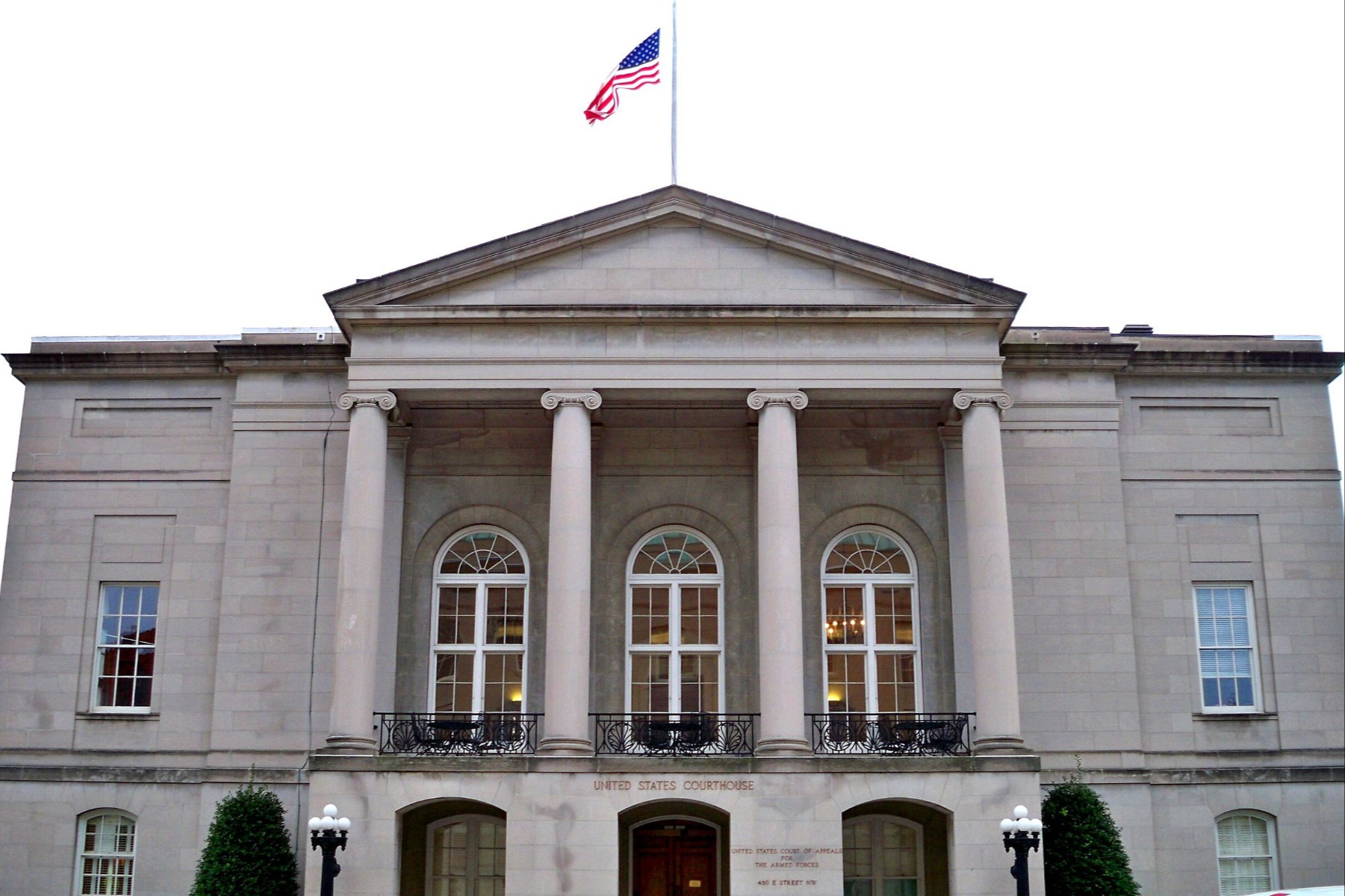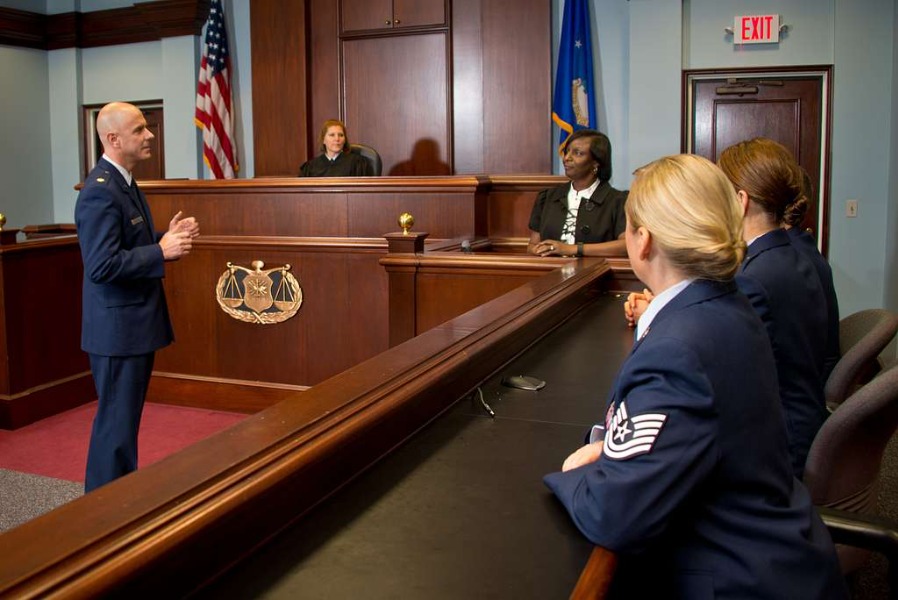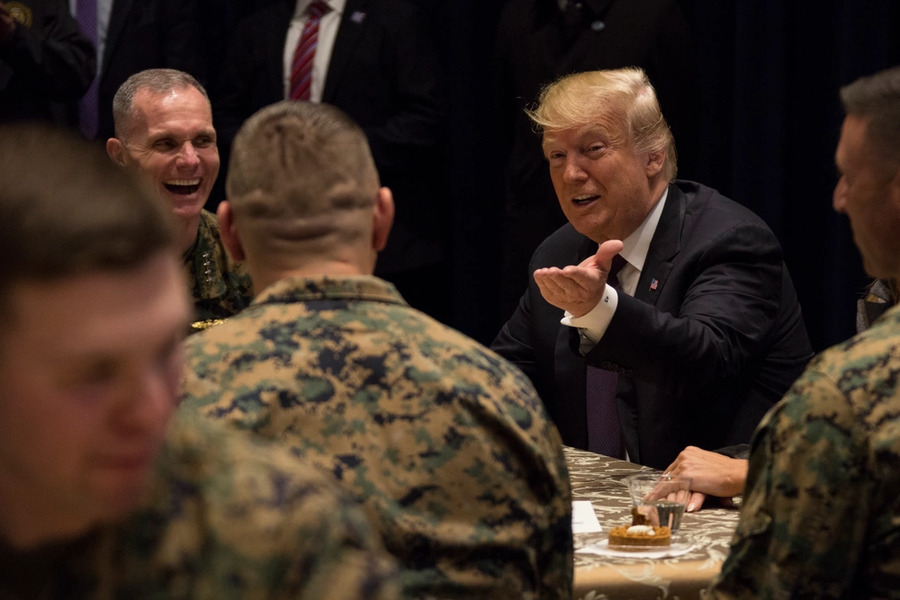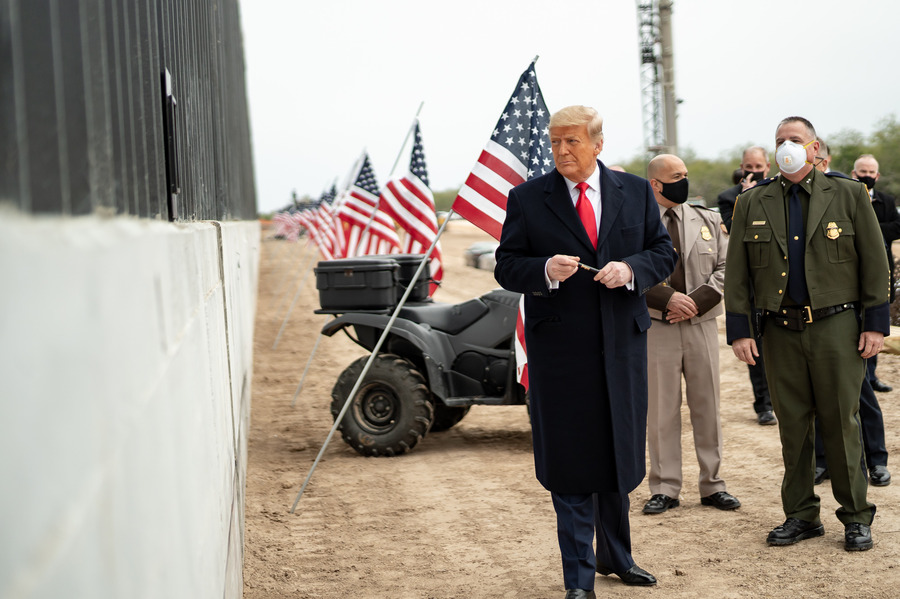Maintaining Military Justice in the Face of Presidential Expansionism
As the administration challenges rules of armed conflict, it is vital to protect the military justice system from executive overreach.

Secretary of Defense Pete Hegseth recently fired the judge advocates general (JAGs) leading the Air Force and Army. He also commissioned his personal lawyer, former Naval Officer Timothy Parlatore, as a Navy commander in the JAG Corps. Parlatore, who spent a year on President Trump’s legal defense team between terms, is perhaps most notable for his involvement in the defense of Navy Seal Eddie Gallagher in his court-martial for the murder of an ISIS prisoner of war. Gallagher’s prosecution—resulting in conviction for taking a photo with a corpse, not for the murder itself—was heavily covered and criticized by Hegseth while a commentator on Fox News. President Trump eventually pardoned Gallagher during his first term.
Hegseth’s behavior, and the president’s, presage a broader trend of administrative actions seeking to undermine long-standing rules and norms governing conflict and military justice. With U.S. troops stationed across the globe and engaged in active hostilities in several areas—including ongoing strikes against the Houthis in Yemen—the administration’s actions are a cause for concern. Military activity is regulated by rules of engagement, which aim to “keep soldiers acting legally and ethically in wars” by seeking to conform behavior to the laws of war. Just as with domestic laws, we expect most people will voluntarily abide by such rules, but that punishment is needed and warranted for those who do not. And where U.S. troops stand accused of violating the laws of war, such as by murdering unarmed civilians, courts-martial provide the mechanism for trying and punishing such criminal acts through an impartial forum, much like civilian courts.
Such a simplified view is more or less how the system should operate, and nominally has (though certainly imperfectly) up to this point. However, in a world of ever-expanding powers for the president—at present, one whose regard for the law of armed conflict appears limited—what is the outlook for continued independence and accountability in military justice?
Presidential power is at its broadest and seems more likely to expand than recede in the near future. Recently, the Supreme Court in Trump v. United States highlighted that “unlike anyone else, the President is a branch of government, and the Constitution vests in him sweeping powers and duties.” The president is also “commander in chief” of the armed forces, which includes command of the military justice system. In this domain, presidential speech may imperil the prospects of a fair court-martial through exercise of unlawful command influence (UCI) seeking to influence the outcome of proceedings.
Accretion of power raises concerns with presidents and their staff intervening in military justice as a general matter. However, the current administration raises particular concerns with the exercise of UCI, inviting novel questions regarding application of the doctrine—namely, whether it applies to beneficial, in addition to adverse, actions against defendants.
Given efforts to alter the role of JAG officers and the military justice system, particularly in limiting accountability for law of war violations, it is imperative that protections against UCI are respected and that the impartiality of the military justice system be maintained. Members of the armed forces are entitled to fair adjudication and verdicts that reflect reality rather than preferences of those in command—nothing more and nothing less. The public likewise deserves a military justice system that reaches impartial decisions concerning misdeeds. Maintaining this barrier against undue influence will ensure that military justice is not an oxymoron.
A (Very) Brief Look at Military Justice
The U.S. military justice system, which dates back to the American Revolution, was overhauled into its current form by congressional enactment of the Uniform Code of Military Justice (UCMJ) in 1950. This was in response to “a variety of problems in the administration of military justice during [World War II], including the potential for improper command influence.” The UCMJ outlines a variety of proscribed offenses and provides for various levels of punishment and process, up to and including courts-martial, depending on the severity of the offense. Courts-martial are initiated and overseen by a “convening authority,” who brings charges against the accused and selects the members of the court-martial panel (the equivalent to a jury). Convening authorities include not only commanding officers within the military itself but also civilian leadership like the secretary of defense and the president. The president is also given the responsibility of promulgating procedural rules governing military trials, with the Manual for Courts Martial updated yearly.
Military justice is a distinct realm, and while due process protections attach, the Supreme Court has recognized that such protections “may differ because of the military context.” In reviewing challenges to the sufficiency of such protections, judicial deference is at its “apogee,” as the Constitution grants Congress “plenary control over rights, duties, and responsibilities in the framework of the Military Establishment.” However, the Court has likewise noted that “a fair trial in a fair tribunal is a basic requirement of due process,” and many of the aspects of courts-martial resemble the civilian judicial system. These include the entitlement of the accused to defense counsel (except in summary courts-martial, which have limited punitive power and to which the accused must consent), the general ability to appeal their convictions, and rules of evidence, which largely resemble those applied in Article III courts.
Unlawful Command Influence
Among the regulations for courts-martial within the UCMJ is a prohibition on any convening authority or person subject to the UCMJ “attempt[ing] to influence the action of a court-martial or any other military tribunal or any member thereof”—known as “unlawful command influence.” UCI is a uniquely military term but one that embodies familiar concepts regarding requirements of fairness and impartiality in criminal adjudications. So important is this bedrock principle that the U.S. Court of Appeals for the Armed Forces (CAAF) has noted repeatedly that UCI is “the mortal enemy of military justice.”
Though UCI is set out as a statutory prohibition, the CAAF—which sits atop the military justice system and hears appeals from each branch—has long outlined that UCI represents “an error of constitutional dimension” because it “tends to deprive servicemembers of their constitutional rights,” including the “right to a forum where impartiality is not impaired.” The CAAF has recently confirmed that the president, as a convening authority, can commit UCI—while denying the claim by former U.S. Army soldier Bowe Bergdahl that President Trump had actually done so when he called Bergdahl, accused of desertion in Afghanistan, a “dirty, rotten, no-good traitor who 20 years ago would’ve been shot.”
Indeed, presidents consistently lay claim to an ever-expanding area of powers, with recent Supreme Court precedents embracing more sweeping presidential authority with respect to removal and immunity. Military justice has not escaped this sweep—on both sides of the political spectrum. Presidents Bush and Obama each made comments on courts-martial that presented UCI concerns. In addition to President Trump’s comments on Bergdahl, Trump’s first term saw questions raised as to the propriety of presidential involvement in the murder investigation of Mathew L. Golsteyn—who ultimately received a pardon. Regardless of one’s view of the expansion of executive authority seen in these areas, this accretion of power at least poses the possibility for misuse and adverse consequences, requiring attention to how it is exercised.
Prosecutions and Presidential Power
While past instances raise concerns as to UCI exercised to obtain convictions, there is reason to think that the current administration is more likely to exercise UCI in pursuit of acquittals. As a commentator during the first Trump administration, Hegseth successfully lobbied for clemency for three service members accused of war crimes, and in his 2024 book, “The War on Warriors,” he expressed disdain for JAGs as well as the law of armed conflict itself. He has characterized JAGs as “roadblocks” to action and has chafed under “burdensome rules of engagement.” This past behavior, coupled with recent restructuring of JAG leadership, suggests an opposition to war crime prosecutions or convictions.
Much of the CAAF’s UCI doctrine has been articulated in the context of safeguarding against pressure to obtain guilty verdicts. This makes sense both as a paramount concern for unwarranted punishment as well as defendants being the ones motivated to bring claims. The upshot of this focus is that, as a constitutional entitlement bound in due process of the defendant, the president cannot outright do away with the prohibition against UCI while the courts remain willing to enforce its requirements.
However, the underlying concern with impartial justice carries the same weight as influencing courts-martial to achieve an acquittal. Article 37 draws no distinction on the basis of verdict or outcome sought, presenting a blanket prohibition on any “attempt to influence the action of a court-martial or any other military tribunal or any member thereof, in reaching the findings or sentence in any case.” Indeed, the CAAF has expanded the doctrine in policing not only “actual” UCI but “apparent” UCI as well. Thus, where behavior “place[s] an intolerable strain upon the public’s perception of the military justice system,” UCI may be found even absent a showing of “prejudice to an accused.” And while this move has not been without critics, it reflects a concern for systemic legitimacy and fairness that is well aligned with the underlying purpose of prohibiting UCI. While the wholesale refusal to bring charges may escape legal scrutiny as an exercise of prosecutorial discretion, once proceedings have been initiated, UCI might be found to burden the prosecution’s case.
In this way, it is useful to analogize UCI to a more common counterpart in civilian cases— Batson violations, wherein discrimination (based on race, sex, etc.) is exercised to prevent classes from participating as members of a jury. While initially articulated in the context of a defendant’s challenge to the prosecution’s behavior, and most often raised by defendants, the Supreme Court has made clear that the defense is likewise precluded from engaging in such behavior. The Court has emphasized that the prohibition on such behavior is grounded, at least partially, in the juror’s right to participate as a jury member in the administration of justice.
Of course, doctrine surrounding Batson is not itself overly clear, and its constitutional underpinnings are not a direct analogue to UCI, making it an imperfect comparator. Regardless, Batson’s utility is not as a model for UCI doctrine but, rather, in the underlying logic and constitutional concern animating Batson doctrine as a useful point for comparison and consideration to make UCI workable and effective in protecting the integrity of military justice.
Expanding UCI doctrine to encompass actions against the prosecution raises certain difficulties. Foremost and fundamentally is the question of who would raise such a claim. The defendant who has been acquitted would have no incentive (and perhaps no standing) to put forth such a claim. The prosecution might be able to raise such a challenge, as with Batson violations, but this does not appear to have been contemplated by any CAAF opinions on UCI. This is not as far-fetched as it might appear at first glance, given that UCI is not only prohibited but constitutes a discrete violation punishable under UCMJ Article 98’s ban on “fail[ing] to enforce or comply with any provision of this chapter regulating the proceedings before, during, or after trial of an accused.” The president and civilian leadership are, of course, not subject to the UCMJ (and thus outside the sweep of Article 98), but members of the armed forces perpetuating UCI from above could be punished—though it appears no one has actually been prosecuted for UCI under Article 98. Regardless, nothing in the text of Article 37 or the CAAF’s UCI jurisprudence precludes extension to influencing a not-guilty verdict, and the concerns with fair adjudication undergirding the doctrine weigh in favor of such application.
The Problem With Pardons
Outside of UCI and influencing the proceedings of courts-martial, President Trump has shown a proclivity for pardoning members of the armed forces implicated in war crimes, which itself raises concerns about the fair administration of justice. Realistically, there is likely little that the CAAF or Congress can do in response to such actions, as the Constitution vests broad authority in the president over pardons that “cannot be modified, abridged, or diminished by the Congress.” However, the pardon power is textually limited to “Offences against the United States”—thus being unavailable for state crimes. The Constitution also empowers Congress to “define and punish ... Offences against the Law of Nations.” Thus, it has been advanced that Congress might limit the presidential pardon power over war crimes by expressly defining such actions as offenses against the law of nations rather than the United States. However, regardless of the constitutional legitimacy of such a move, the practical outlook of such action seems vanishingly slim given the broader political polarization and inaction in Congress.
A statement that the president intends to pardon an accused if convicted—though perhaps beyond the limits of UCI as a doctrinal tool—nonetheless raises the same type of fairness and rule of law issues implicated by UCI, applying pressure to specific proceedings and eroding the system more broadly. And presidential invalidation of (at least presumably) fair convictions undermines the legitimacy of military justice—while also arguably violating international law obligations to prosecute and punish war crimes when they occur. For these reasons, such behavior at least demands public attention and opprobrium if direct oversight is not feasible.
Maintaining UCI Prohibitions in the Face of Presidential Expansionism
As the current administration advances aggressive arguments as to executive authority and seeks to reshape the JAG Corps, it is important that boundaries around UCI and an independent military justice system remain in place.
Congress has important equities in maintaining the legitimacy of military justice, given its lead role in prescribing the rules and manner of the system through the UCMJ. Though Congress has already outlawed UCI, one might hope that it could bring its oversight powers to bear to police possible violations. However, as with many areas of congressional oversight and involvement, the prospects of policing seem dim, especially given that military justice is an issue that only sporadically captures public attention. Recent congressional forays into military justice suggest that congressional intervention may even be counterproductive—such as Sen. John McCain’s statements about the Bergdahl court-martial while chair of the Senate Armed Services Committee (and subject to the UCMJ as a retired member of the Navy), where McCain called Bergdahl a “deserter” and said hearings would be held if Bergdahl was not punished. However, Congress has shown recent involvement in the domain by shifting prosecution powers and discretion from commanders to Offices of Special Trial Counsel for certain serious offenses, including murder. This move may both limit (somewhat) the ability of presidential administrations to stymie war crime prosecutions as well as suggest some amount of congressional willpower to police military justice.
The CAAF, whose five judges serve 15-year terms of office, is not set to have a vacancy until 2028. Given that all members of the court agreed that presidential action could constitute UCI, with two judges dissenting on whether UCI had actually occurred, reversal of position seems unlikely even with turnover on the court since the CAAF’s Bergdahl decision.
Likewise, members of the armed forces may seek collateral review in an Article III court for their court-martial conviction. Although a deferential standard is applied, it is not toothless. After losing at the CAAF, Bergdahl brought his case before the D.C. district court, where Judge Reggie Walton approved of the CAAF’s findings as to UCI but invalidated Bergdahl’s conviction due to claims of impropriety by the trial judge. The government has appealed this determination to the U.S. Court of Appeals for the D.C. Circuit, where it is currently pending.
That said, the necessity of intervention by the judiciary (military or civilian) or Congress would, to some extent, indicate a failure of the system; the president and those he directs should seek to avoid UCI in the first instance. As a practical matter, avoiding UCI allows convictions to withstand challenges. More important, the president and those under his command should, in theory, desire an impartial justice system that is viewed as such by the public. Even where behavior does not veer into unlawful territory, the president and those in authority would be wise to avoid statements and behavior that carry the risk of eroding trust in the military justice system.
***
George Washington emphasized that “discipline is the soul of an army.” He also stressed the importance of service members “having had a fair trial, and any charges alleged against [them] being properly proved” through courts-martial. Members of the armed forces are entitled to an impartial trial, whether guilty or not, and the public has a right to a system of military justice that seeks fair and valid outcomes. Attention must be paid to ensure that such guarantees remain in place. The alternative is a return to the abuses and errors that motivated the restructuring of military justice in the first place—an untenable and unacceptable step backward.




